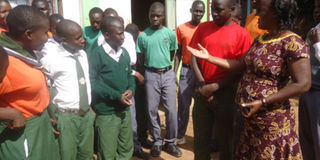Widow raising 14 children all by herself

Kyebakobaku with some of her students. Photos by Matthias Wandera.
Josephine Kyebakobaku Mpango, a 47-year-old resident of Bugamba Nkono, Iganga District, has single-handedly raised 14 children, four of whom are biological, and 10 adopted over time.
She is a passionate educationalist, determined to do her bit to eradicate illiteracy that is still rampant in most parts of Busoga, her motherland.
Today, she sits at the helm of Greenfields High School as founder and director in Iganga District.
As the sole bread winner to a large family, Mpango conducts other business to make ends meet. She grows maize, tailors and supplies school uniforms, assisted by younger women she has taught to tailor. “As a single mother, I have to work hard, be versatile and strong. But so should any other woman,” she says.
The journey to date
I meet Josephine in her office at Greenfields High School. It is not a luxurious space; just a desk, a visitor’s chair, her own, and piles of books in the corner onto which about half a dozen trophies rest, evidence of the school’s achievement in regard to co-curricular activities.
Seated behind her desk, she comes off as a very severe woman who means business all the time. Indeed, she is not easily shaken. She, for instance, speaks about the loss of loved ones in a calm and composed tone, almost in passing. But perhaps this strong emotional background is a result of the hard life she endured growing up, and the tough experiences that have stalked her into adulthood.
Kyebakobaku did not grow up in a well-to-do family. Her mother was a housewife and even though her father was an agricultural assistant, the eight children made for a big burden on his side. They did not grow up with much but he somehow managed to keep them in school.
However, in 1986, when she was in her Senior Four, her father passed on from diabetes, leaving the family struggling to survive. “I did not join A-Level because we could not afford it. I opted to pursue a cheaper course in Secretarial Studies at YMCA in Jinja,” she reveals. Since her mother had four other children to support, Kyebakobaku learnt to tailor to supplement her tuition bill and helped pay her younger sister’s tuition.
Inspiration from her late husband
Her late husband, Dr George Mpango, a chemist and a Makerere University professor in food science and technology, had first inspired Josephine to teach. He taught her to sensitise women in Busoga sub-region about the Kwashiorkor that had engulfed the region.
“Because he was too busy to do it himself, he taught me what I need to know to sensitise our people about kwashiorkor that had become a problem in the region,” she explains, “Through KDG (Kigulu Development Group) I started going to every corner, mostly villages in Iganga, sensitizing groups of parents, especially women on the right feeding habits for their children.”
Dr Mpango had also noticed while lecturing at the university that few of students from the Busoga sub-region made it to university and few made it onto the science programmes.
Getting more Basoga to university
The couple decided to open up a school that would promote science education in the region. That is how in 1998, Greenfields High School opened, first with just O’Level, and two years laters, A’Level.
“Exactly two years after that, two of our students made it to Makerere University on government sponsorship. One was to study food science and technology, and the other Chemistry. To us, this was a dream come true. What we had envisioned was now starting to fall into place,” recounts Kyebakobaku.
Unfortunately, Dr Mpanga was around the same time diagnosed with diabetes to which he succumbed in April 2008. “I was devastated. For the few weeks that followed I just sat down and drowned in self-pity.
I knew it was the end of me. My life was so dependent on him that when he died I could not see how I was going to push forward without him,” she narrates. But she was left with their four children and two relatives to take care of. The youngest was seven and the oldest 16.
The family’s financial condition had also taken a turn for the worse, after her late husband’s family sued to take over the school. Every day became a hustle and they sometimes slept hungry, but she managed to keep the school and keep all the children in school.
“The school of course helps to keep me afloat, financially. But most importantly, it allows me to do what I love, which is to be a part of educating and inspiring my country and my region. To be honest, it is as if I spend every day of my life here at school. The few days I don’t get to make it, I feel a piece of me is missing.
“I also attach a certain sentimental value to the school as it is a representation of what my husband stood for. He loved to educate.”
Sometimes, she fantasises about how differently things would have turned out if her husband was still around. But she does not dwell on this so much.
She has accepted that she is their father and their mother, and she is happy with how they are turning out.
Kyebakubako’s two eldest children have completed school, three at university while the rest are all in secondary school and singlehandedly she pays their school fees.”




